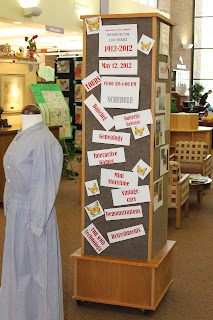“I am writing this with mixed emotions. This is something I feel I should do
because I feel it is for the best interest of the library—my second home for
the past 27 years.” So began MPL
Director Bonita Marley’s retirement letter to the MPL Board of Trustees, dated
September 6, 1983.
“With your permission, I would like to remain [as director]
until March 1st, 1984 to be able to have things in the best order
possible for my successor and to make out the annual report for 1983, which
will be done in February [1984].”
Bonita would not have left the Library in the lurch; she made every
effort to assure a smooth transition to the next director.
“No doubt, in the near future, you may be able to go into a
building program and into more automated procedures in carrying out the
business of the library and adding to its adaptability and efficiency.” Bonita knew that library technologies
were changing, and she felt that a new, younger director, schooled in the
latest computer systems, would be an asset to her growing community’s
informational needs.
“I am more than grateful for the opportunity that was given
me to start here as clerk in 1957 and then be able to advance to
librarian. I have had the most
wonderful cooperation and support from all trustees from the day I began and
including my friends of the present board.”
“[Leaving MPL] is not easy to do, but I feel it is best, for
I always want the very best for the library.”
And so Bonita Marley retired as MPL Director and Librarian
in April, 1984. She had turned age
78 on February 11. Her final
librarian’s report to the Library Board was entered into the minutes on April
2, 1984. On April 6, 1984, the
Board hired her successor, librarian Sharon Beatrice, who was MPL Director from
that time until 1987, when she changed careers to pursue other service-oriented
work with Native Americans in Arizona.
As sometimes happens when examining the historical record,
even in a small town like Mooresville, the Library has no photograph of Ms.
Beatrice, except for a fuzzy black-and-white photocopy of a newspaper clipping
from the Mooresville Times that would
not reproduce well digitally.
Apparently, nobody thought to take a snapshot of the new library
director for our vertical files.
When you’re living history at the moment, you don’t always think of such
things.
Ms Beatrice left the Library in 1987, the year construction
began on a new building.
Subsequent (and current) MPL Director Diane Huerkamp (2004-present)
attempted on several occasions to obtain a photograph from Ms. Beatrice, but
none has ever been received. So
there hangs an empty director’s plaque on the directors’ wall at the north end
of the Great Hall at the Library. The best we can do is a picture from a 1987 newspaper clipping.
Although Mrs. Marley retired in 1984, she remained an active volunteer at the Library and used her lifetime of community service contacts (friendships, really) in Mooresville to assist in the planning and construction of a new building at the Library’s current location of 220 West Harrison Street. That structure, known commonly as the “1988 Library,” since 2006 has been the MPL Youth Services Department, to which was constructed an addition in 2005-2006, which included the Bonita C. Marley Library Community Room.
It would be impossible to exaggerate Bonita Marley’s
significance to her Library and her community. We would not enjoy the Library we have today had it not been
for her tireless dedication. How
fortunate we would all be if we, too, could provide a lifetime of public
service to our hometowns.














































